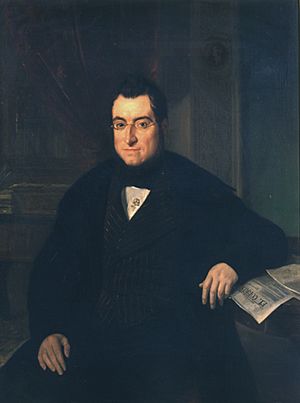Buenaventura Carlos Aribau facts for kids
Buenaventura Carlos Aribau (born in 1798, died in 1862) was a smart and talented person from Spain. He was many things: an economist (someone who studies money and how people use it), a stenographer (someone who writes very fast using shorthand), a writer, and a politician. He wrote in several languages, including Spanish, Catalan, Latin, and Italian.
A Look at Aribau's Life
Buenaventura Carlos Aribau was very curious and loved to learn. He studied writing and poetry at a special school called the Conciliar Seminary. He also started learning about physics, but he had to stop because of family problems.
When he was young, in 1815, he helped start a group called the Societat Filosòfica (Philosophical Society). He also published some of his early poems in a book called Ensayos poéticos.
In 1820, he was very excited about a big change in Spain. This was the start of the Liberal Triennium, a time when Spain tried to have a more liberal government. Aribau started working as a journalist for a newspaper called Diario Constitucional. He also began his career in politics. In 1823, he became the secretary for the Diputació de Lleida, which was a local government office.
Around this time, he also joined the Academy of Fine Arts in 1820. In 1823, he helped create and edit a very important magazine called El Europeo. This was one of the first big romantic magazines in Catalonia. He was inspired by an Italian writer named Alessandro Manzoni. Aribau even suggested that his friend Juan Nicasio Gallego translate Manzoni's works into Spanish. Aribau was also good friends with a writer and lawyer named Ramon Muns i Serinyà.
What Did Aribau Write?
Buenaventura Carlos Aribau wrote many different things during his life. Here are some of his notable works:
- Poetic Essays (1817)
- Libertad, libertad sacrosanct (1820) – This was a revolutionary song.
- The freedom restored (1820) – He wrote this with other authors.
- In Ms. Leticia Cortesi (1821)
- The Homeland (1833) – This is one of his most famous poems.
- The Virgen of Dolores (1845)
- In Ms. Maria Dolores Belza
See also
 In Spanish: Buenaventura Carlos Aribau para niños
In Spanish: Buenaventura Carlos Aribau para niños


